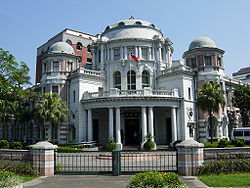Control Yuan

Logo
|
|
 |
|
| Agency overview | |
|---|---|
| Formed | February 1931 |
| Jurisdiction | Government of the Republic of China |
| Headquarters | Zhongzheng, Taipei, Taiwan |
| Agency executives |
|
| Website | www.cy.gov.tw |
| Control Yuan | |||||||||||||||||||||||||||
| Chinese | |||||||||||||||||||||||||||
|---|---|---|---|---|---|---|---|---|---|---|---|---|---|---|---|---|---|---|---|---|---|---|---|---|---|---|---|
|
|||||||||||||||||||||||||||
| Transcriptions | |
|---|---|
| Standard Mandarin | |
| Hanyu Pinyin | Jiānchá Yuàn |
| Bopomofo | ㄐㄧㄢ ㄔㄚˊ ㄩㄢˋ |
| Gwoyeu Romatzyh | Jianchar Yuann |
| Wade–Giles | Chien1-ch'a2 Yüan4 |
| Tongyong Pinyin | Jianchá Yuàn |
| MPS2 | Jiānchá Yuàn |
| Hakka | |
| Romanization | Kam-chhat Yen |
| Southern Min | |
| Hokkien POJ | Kàm-chhat Īⁿ |
| Tâi-lô | Kàm-tshat Īnn |
The Control Yuan (CY; Chinese: 監察院; pinyin: Jiānchá Yuàn; Wade–Giles: Chien1-ch'a2 Yüan4), one of the five branches of the Government of the Republic of China (Taiwan/ROC), is an investigatory agency that monitors the other branches of government. It may be compared to the Court of Auditors of the European Union, the Government Accountability Office of the United States, a political ombudsman, or a standing commission for administrative inquiry.
Control Yuan was established in February 1931 succeeding the role of Auditing Yuan (Chinese: 審計院). Auditing Yuan was subsequently downgraded to a ministry and incorporated into the Control Yuan.
The structure of the Control Yuan consists of the President, Vice President, a 27-member council and the Ministry of Audit (also known as the National Audit Office).
The council of the Yuan, chaired by the Yuan President, is divided into a number of committees to fulfill the Yuan's various purposes.
Committees
The seven standing committees cover the following:
In addition, Control Yuan members join five special committees:
An Administrative Appeal Committee, operated under the aegis of the Control Yuan but consisting of both members and non-members of the Control Yuan, considers administrative appeals which are inappropriate to both the Control Yuan proper and the Ministry of Audit.
Finally, two organizational affairs committees:
No member of the Control Yuan can hold another public office or profession while serving in the branch (according to Article 103 of the constitution), and members must be able to perform absent of partisan control or influence. Members can vote in no more than three committees and can join additional committees as non-voting members. Each committee can have up to 14 members and usually elects a convenor amongst themselves to chair committee meetings.
...
Wikipedia
